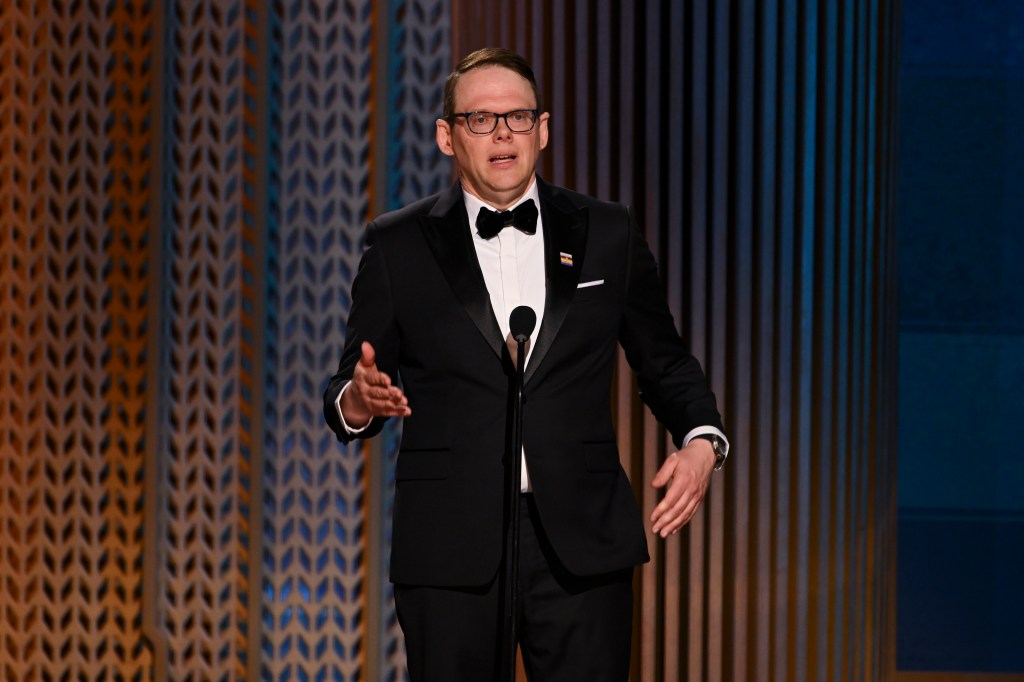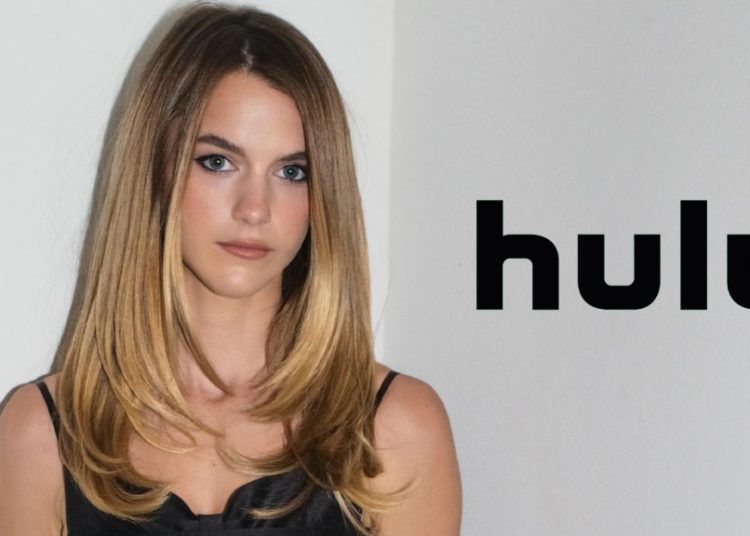Duncan Crabtree-Ireland hasn’t had much time for victory laps. The National Executive Director and Chief Negotiator of SAG-AFTRA played a key role in settling the 2023 actors strike, after months of intensive bargaining, picketing and rallying of the troops. One of the key provisions of the landmark agreement pertains to a thorny issue for union members that continues to keep Crabtree-Ireland on the move: AI.
SAG-AFTRA secured protections against the studios and streamers using artificial intelligence in a way that could result in job losses or infringement on performers. Creating and reinforcing guardrails around AI is a mission that Crabtree-Ireland connects with personally, as deepfake videos of him began circulating in 2023 at the height of the labor strife and amid the unsettling arrival of ChatGPT. Along with advocating for the federal No Fakes Act, a bipartisan bill now working its way through Congress, Crabtree-Ireland was an active presence at major tech conference CES last January in Las Vegas. He took part in panels about AI at the main convention as well as at the Labor Innovation & Technology Summit, an event co-founded by SAG-AFTRA, the AFL-CIO and the AFL-CIO Tech Institute.
In this conversation with Deadline Business Editor Dade Hayes about his view of AI’s spread throughout the entertainment industry and beyond, Crabtree-Ireland talks about changes in the atmosphere since 2023; studios’ more “cautious” approach to the technology; and SAG-AFTRA’s ongoing efforts to resolve its 10-month strike against video game publishers. The following transcript has been edited for clarity and length.
Watch on Deadline
DEADLINE: At CES, you called AI “a tool and also an existential threat.” Based on my observation and also what sources have told me, it seems that the sentiment is shifting a bit more toward the former. Would you agree?
DUNCAN CRABTREE-IRELAND: I think that’s right. When we think about AI, I think people forget that so many people didn’t know anything about it in late-2022 and early-2023. ChatGPT only was released to the public in November 2022, and at that point we had been working on the issue for quite some time. In fact, I was preparing to deliver my first public presentation on AI and the entertainment industry and its potential impact, which happened to be the first week of December 2022. The reaction to those concerns at the time was that a lot of people really didn’t get it. They didn’t understand why it was important or the kind of impact it could have. I think that the public dialogue we had in 2023 did alert people to the importance of this issue and got people to recognize that the impact is very real. I know there are people who feel that maybe people are overly paranoid or whatever. I really feel that people are not overly paranoid about it. In fact, it warrants real attention and caution. It’s not to say it has no value or benefit; clearly, it does have value and benefit. But we must not forget that even some of the people on the forefront of AI on the tech side are concerned about the potential ramifications of AI if it’s not properly governed and regulated. So, I think that people in general do see that this is a tool that can have some beneficial uses, but that has to be carefully scrutinized and that we all need to be part of that conversation. We can’t leave that conversation to AI companies or just tech companies and let them drive that discussion because they are more focused on ‘what can you do and how can we do it faster than anyone else’ rather than ‘should we do it at all?’ and ‘if we should, should we do it faster or slower?’
DEADLINE: Does the greater awareness of the risks extend to the studios?
CRABTREE-IRELAND: No one will ever know how much this is the result of the 2023 negotiation and strike, but the studios in my opinion generally have been taking a relatively cautious approach to developing and moving forward with plans related to AI. At least, that’s my impression from the many, many conversations that I’ve had with people all across the industry, and I think that’s a really good thing. Because really, when you stop to think it through and you don’t just knee-jerk react and say, ‘OK, you can do this so let’s just do it,’ then you can see some of the unintended consequences that you might not otherwise notice. So, I do think that a more tempered approach to considering the implementation of AI works in the interests of the industry as a whole and certainly in the interests of workers and creative talent.
DEADLINE: That’s really interesting. I am definitely hearing more notes of pragmatism and measure in the public comments in recent weeks from the likes of Netflix Co-CEO Ted Sarandos and NBCUniversal Entertainment and Studios Chairman Donna Langley. Still, money is continuing to flow into the space, especially to fund small, boutique companies – how do you and your colleagues track all of the startups and look to engage with them?
CRABTREE-IRELAND: Well, soon as they hit our radar, generally, we reach out and we try to meet with them just so that we can understand what they’re doing and, frankly, so we can also introduce ourselves in our real role and capacity, not what sometimes people may perceive. Which is wanting to really help companies find a way to put appropriate plans in place that are talent-respectful – not designed to stop them from being able to experiment and pursue their business, but to do it in a way that works with talent instead of against talent. A lot of the time I don’t think it’s malicious or malevolent. It’s just not really understanding the potential impact of what they’re doing. I find that to be true across a number of fields, including the tech and the AI companies themselves, the companies that are taking AI foundational models and tools and using them to implement tools that are done directly and used by the creative talent or others in the industry. And even just industry companies that aren’t tech companies that are just being pitched with capabilities that they don’t necessarily fully grasp.
DEADLINE: SAG-AFTRA’s strike against video game companies is approaching the 10-month mark. You have gotten dozens of companies to sign an interim agreement, but is there any chance of a full resolution anytime soon?
CRABTREE-IRELAND: I hope so. I mean, I think anytime the parties are talking there is room for hope and cautious optimism, and we have been engaged in talks with the bargaining group recently. And that process is ongoing, so obviously we would love to bring the strike to close. I mean, I would’ve loved if it had not been necessary in the first place. But as you probably know, this particular strike the video game strike is entirely about AI. It’s not that there are other issues that we haven’t been able to find agreement on. We’ve been able to deal with the question of wage increases, the question of safety, and issues of working conditions, so this is entirely focused on AI. It’s been very, very difficult because from my point of view, the companies have been unwilling to embrace the same philosophy that everybody else in the entire entertainment industry at large has embraced. Having said that, we are having ongoing talks with them and I really hope and fundamentally believe that we will get there.
DEADLINE: The No Fakes Act is winding its way through Congress. Looking back on 2023, how did having your own experience with deepfakes right in the middle of an intense period of negotiations shape your view of the issue?
CRABTREE-IRELAND: I’ve kind of gotten used to the fact that it happened. It’s a little unnerving, I guess, or disturbing, but it was really shocking at the time. And not a good feeling. This was something I felt really strongly about it before that, and I’ve been advocating about abusive deepfakes for years, but it’s something when you experience it firsthand. I don’t want anyone to have to feel that experience, but so many of our members feel it and, unlike for me, it’s not an isolated incident. It’s a daily occurrence. So the idea that anyone could think that the First Amendment only means that you get to say what you want to say is baffling to me. If someone else is allowed, on First Amendment grounds or for any reason, to put words into your mouth and make it appear as though you believe something you don’t believe or advocate for something you don’t believe in, to me that’s as harmful to the final freedom of speech as limiting the speech. I think that is equally contrary to freedom speech and association. I think that that message is very much resonating and if you saw the list of people and organizations supporting the No Fakes Act, it’s quite a coalition. It ranges from OpenAI and Google to us to the MPA to people who aren’t normally on the same side of these types of issues.
DEADLINE: But why do you see this current effort succeeding, after a previous version of the bill stalled?
CRABTREE-IRELAND: Federal legislation is always a challenge, particularly in this moment. It had been active at the end of the last Congress and then events overtook us. The Senate was very focused on confirming judicial appointees and almost nothing else and so It just ended up being that the circumstances around it didn’t foster an opportunity. But I believe there really is a strong commitment on both sides of the aisle to make it happen. I think it also helps that people recognize that it’s not only about our numbers or professional performers because this is something that affects all of us and this law benefits all of us. I’m certainly not a professional performer, but it would’ve been tremendously beneficial to me and to anybody from high school students to homemakers to those working in medicine or really almost any field. I’m really hopeful that this can be one of those things that even in our very contentious times will make people say, ‘Hey, this is something we can all get behind. Let’s do it.’
The post SAG-AFTRA’s Duncan Crabtree-Ireland On Why Studios And Streamers Are Taking “A More Tempered Approach” To AI appeared first on Deadline.




